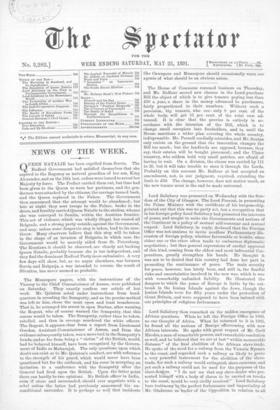The Muneepore papers, with the instructions of the Viceroy to
the Chief Commissioner of Assam, were published on Saturday. They exactly confirm our article of last week. Mr. Quinton acted under instructions from head- quarters in arresting the Senaputty, and as the precise method was left to him, chose the most open and least treacherous. That is, he arranged his arrest in open Durbar, after warning the Regent, who of course warned the Senaputty, that this course would be taken. The Senaputty, rather than be taken, rebelled, and then in revenge murdered the white officers, The Regent, it appears clear from a report from Lieutenant Gurdon, Assistant-Commissioner of Assam, and from the evidence subsequently taken, was a mere tool in the Senap utty's hands, and so far from being a " victim " of the British, would, had he behaved himself, have been recognised by the Govern- ment of India as Maharajah. The only questions upon which 'doubt can exist as to Mr. Quinton's conduct, are with reference to the strength of his guard, which would never have been questioned but for the outbreak, and his error in accepting an invitation to a conference with the Sonaputty after the General had fired upon the British. Upon the latter point there can hardly be two opinions. No British officer in India, even if alone and surrounded, should ever negotiate with a rebel unless the latter had previously announced his un- conditional surrender. It is perhaps as well that incidents
like Cawnpore and Muneepore should occasionally warn our agents of what should be an obvious axiom.


































